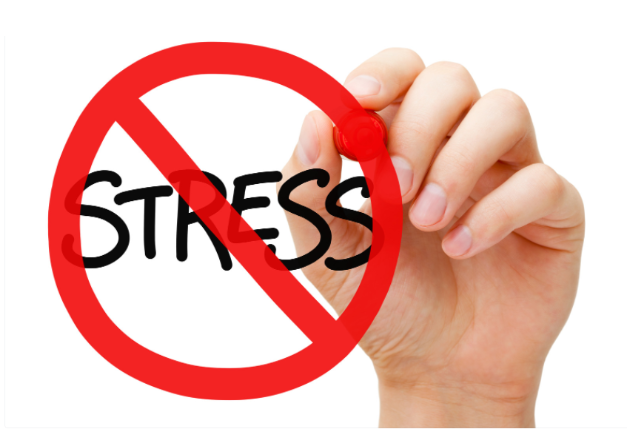Stress can be caused by any number of things in our daily life: work, family, friends, money, health, hectic schedule, major life changes, and more. When it comes to situations such as these, they can either cause stress for a short period of time (acute stress), or for long periods (chronic stress). While acute stress can disappear within a day, it is important to destress so it does not progress to chronic stress. Although chronic stress is more harmful to us, all stress is detrimental to our health and our weight.
A study was done on women in 2015 where they were interviewed on their stressors they may or may not have, and after their interview they consumed a high-fat, high calorie meal. After consuming the meal, their metabolic rate was tested and based on the interview, if these women had one or more stressors, their metabolism decreased by 104 calories a day compared to women with no stressors! This decrease in natural calorie burn was caused by acute stress after one meal so imagine the effect of years of chronic stress combined with unhealthy eating habits! With increased levels of stress, it can increase cravings for comfort foods, such as a high-fat, high calorie meal. If you were to eat a high-fat, high calorie meal daily, this would add up to be an 11-pound weight gain per year. (1)
Acute stress can lead to short-term physical reactions such as:
- Increased cortisol levels
- Increased heart rate
- Increased blood pressure
- Anxiety
- Mood swings
- Poor sleep
- Poor concentration
If you are experiencing increased cortisol levels, anxiety, poor sleep and all of the other detrimental side effects associated with acute stress it is important to address your stress levels right away. Failing to deal with acute stress over a long period of time can result in your acute stress developing into chronic stress.
Chronic stress has a number of negative health effects such as:
- Heart disease
- High blood pressure
- Type II diabetes
- Stroke
- Reproductive issues
- Decreased lung function
- Increased joint pain
When you are stressed, your body releases the hormones cortisol and adrenaline, which causes the body to release emergency glucose into the bloodstream and puts your body into “fight or flight response”. Once adrenaline wears off, your blood sugar decreases and causes cortisol levels to increase, decreasing your metabolism and making it harder to lose weight.
The side effects that are associated with stress can cause you to develop negative habits to deal with stress, such as drinking caffeine when sleep-deprived and skipping your daily exercise from being exhausted. Habits such as these can then lead to weight gain. If you do suffer from chronic stress and weight gain, it can decrease your overall health, potentially increasing your risk of chronic disease.
High levels of stress can lead to unhealthy habits. Here are some examples of habits that occur due to stress:
- Eating when stressed – If you find that you tend to eat more when you are stressed, you may experience something called emotional eating. You can identify if you emotionally eat if you find that you are suddenly hungry versus becoming hungry over time, are craving something specific (sweets, salty foods, alcohol, etc.), feel guilty or bad about your food choices after eating, or if you find that as you keep eating you don’t feel satisfied or cannot stop. If you find yourself reaching for certain foods, such as cheese or ice cream, that can be due to the fact that those foods release casomorphins (opioid form of casein after it has been digested), which triggers dopamine release in the brain. This is why certain foods can be addicting, because they make us feel good when stress is bringing us down!
- Skipping meals – The opposite of emotional eating is avoiding meals or not making the time to eat, which then causes your body to not be properly nourished during stressful times. Skipping meals during the day can cause you to binge eat at night. It is hard to lose weight when your body is not having enough calories to perform daily functions, and it is also hard to lose weight when you binge eat!
- Eating a fast food diet – Although it is convenient, eating a fast food diet is not often associated with weight loss. Usually you would resort to fast food if you have lack of motivation to cook or feel the urge to eat something right away versus taking the time to go to a sit-down restaurant and ordering a healthier option or preparing a meal at home. Having too much on your to-do list or a hectic schedule can be stressful and decrease the time you have when it comes to making meals which can lead to you choosing fast food over healthy options.
- Lack of exercise – When you are stressed, it is hard to make time for yourself and your goals. It is easy to fall out of your routine and lose focus on natural forms of stress relief such as exercise.
- Lack of sleep – If you are not getting enough sleep due to stress, you are decreasing your metabolism and you are increasing the risk of making unhealthy food choices in the middle of the night or the next day.
If you find that you are trying to lose weight while you have high levels of stress, it is important to make lifestyle changes that decrease and relieve stress as much as possible and practice healthy habits that will help support your weight loss.

Now, let’s transform those habits into positive ones that can decrease stress and promote healthy lifestyle changes!
- Recognize warning signs – If you are stressed often, then you may know what triggers your stress or causes you to practice unhealthy habits. If you notice you are falling back into old habits due to stress, then make it part of your daily routine to reduce your stress in ways such as journaling, being organized, or talking to someone like a family member, friend, coworker, or even yourself!
- Mindful eating – If you are a stress eater, check in with yourself mentally before indulging. Asking yourself if you are truly hungry or if you are just stressed is a great way to practice mindful eating. If you are the opposite and don’t eat when you are stressed, then set reminders for yourself every few hours to eat something such as a handful of vegetables or a small salad to make sure you are still nourishing your body! 30/10 Weight Loss for Life highly encourages writing in a food journal as part of being mindful of your diet. Keeping a food journal can help you be mindful with what you eat and how much you eat each day as you lose weight the healthy way!
- Find healthy versions of your comfort foods – Swapping mashed potatoes for mashed cauliflower, spaghetti noodles for zucchini noodles, and ice cream for a 30/10 popsicle or protein ice cream can be better options for you if you feel the need to have comfort food. Be sure to moderate your portion sizes and don’t feel like you need to have everything in one sitting.
- Organize/plan out your day – Taking the time to create a to-do list and planning for the day ahead can help decrease your stress so you have the day planned out. This can help you prepare ahead of time if you know something stressful is coming up, such as an important meeting, an upcoming trip, or errands you need to run. Find a way that works for you when it comes to planning, either using a calendar, an app, or a planner or keeping post-it notes handy to keep track of things you want to get done in the future!
- 30/10 Audio Inspirations – Part of your 30/10 program includes stress management, which our audio inspirations can help with! Taking the time during your appointment or listening to one at home can instill healthy habits you are making and can help decrease your stress within 20 minutes. Read our audio inspiration blog for more insight on how they can benefit you!
- Exercise – Moving your body can burn cortisol (the stress hormone) and releases endorphins, which elevates your mood and can provide feelings of relaxation. It is important to find a form of exercise that you enjoy to promote your health, keeps you motivated, and reduces your stress.
- Limit caffeine – Drinking too much caffeine can increase cortisol levels, making you feel anxious and jittery. Cutting back on caffeine and turning to sources of natural energy such as fruits and drinking plenty of water can help with stress.
- Sleep/rest – Having a consistent sleep schedule is super important when it comes to reducing stress. It is important to get 6-8 hours of sleep each night, as it can help decrease your stress!
- Find hobbies you enjoy that relieve stress – Hobbies such as gardening, reading a book, knitting, and painting are all hobbies that are not only fun, but can be relaxing! Make time out of your day or week to do what you love and relieve your stress.
30/10 Weight Loss for Life is a comprehensive weight loss program that can help you achieve your goals and weight loss success! Get started with 30/10 Weight Loss for Life by visiting any 30/10 location or call us at (855)-937-3010!
Sources:
Daily Stressors, Past Depression, and Metabolic Responses to High-Fat Meals: A Novel Path to Obesity
Stress and Weight Gain: Understanding the Connection




